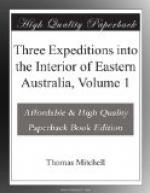Departure from Sydney.
Little time remained for me to look at the sextants, theodolite, and other instruments necessary for the exploratory journey; I collected in haste a few articles of personal equipment, and having as well as I could, under the circumstances, set my house in order, I bade adieu to my family, and left Sydney at noon, on Thursday, the 24th day of November, 1831, being accompanied for some miles by my friend Colonel Snodgrass.
It was not until then, that my mind was sufficiently relieved from considering the details of my department, to enable me to direct my thoughts to the undiscovered country. I had yet to traverse 300 miles, for to that distance from Sydney the flocks of the colonists extended, before I could reach the vast untrodden soil, the exploration of which was the object of my mission. I felt the ardour of my early youth, when I first sought distinction in the crowded camp and battlefield, revive, as I gave loose to my reflections and considered the nature of the enterprise. But, in comparing the feelings I then experienced with those which excited my youthful ambition, it seemed that even war and victory, with all their glory, were far less alluring than the pursuit of researches such as these; the objects of which were to spread the light of civilisation over a portion of the globe yet unknown, though rich, perhaps, in the luxuriance of uncultivated nature, and where science might accomplish new and unthought-of discoveries; while intelligent man would find a region teeming with useful vegetation, abounding with rivers, hills, and valleys, and waiting only for his enterprising spirit and improving hand to turn to account the native bounty of the soil.
A garden.
My first day’s journey, terminated near Parramatta, at the residence of Mr. John Macarthur. I was received by that gentleman with his usual hospitality, and although not in the enjoyment of the best health, he insisted on accompanying me over his extensive and beautiful garden, where he pointed out to my attention, the first olive-tree ever planted in Australia. Here I also saw the cork-tree in full luxuriance—the caper plant growing amidst rocks—the English oak—the horse-chestnut—broom—magnificent mulberry trees of thirty-five years’ growth, umbrageous and green. Beds of roses, in great variety, were spread around, and filled the air with fragrance, while the climbing species of that beautiful flower was equally pleasing to the eye. I observed convict Greeks (Pirates.)—acti fatis—at work in that garden of the antipodes, training the vines to trellises, made after the fashion of those in the Peloponnesus. The state of the orange-trees, flourishing in the form of cones sixteen feet high, and loaded with fruit, was very remarkable, but they had risen from the roots of former trees, which, having been reduced to bare poles by a drought of three years’ duration, had been cut off, and were now succeeded




